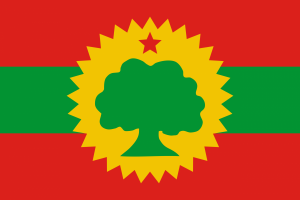Language/Borana-arsi-guji-oromo/Culture/Eating-Customs
| ◀️ Traditional Dishes — Previous Lesson | Next Lesson — Present Tense ▶️ |
Introduction
Welcome to the lesson on Borana-Arsi-Guji Oromo eating customs and table manners. In this lesson, you will learn about the unique ways Borana-Arsi-Guji Oromo people carry out their meals, the etiquette associated with it, and how certain foods are shared or avoided. Eating customs and table manners are an essential part of any culture, and they show respect and appreciation for the people and the food.
Borana-Arsi-Guji Oromo Eating Customs and Etiquette
Borana-Arsi-Guji Oromo eating customs are traditionally communal activities, with people sitting around a shared dish or platter, eating with their hands. Eating together is signified in daily life, and meal times are usually respected, with everyone stopping work or play to take their meal. The ethos behind Borana-Arsi-Guji Oromo eating customs is the importance of sharing and togetherness.
Having large families is a common feature among the Borana-Arsi-Guji Oromo people. As such, mealtime is a special moment to bond with one another, share experiences and engage in light-hearted conversations that help build relationships. Meals are therefore held in high regard within the presence of families and friends.
Borana-Arsi-Guji Oromo people often use the right hand to handle food while the left hand is reserved for other tasks, such as holding a cup or a water gourd. Using the left hand to handle food is seen as inappropriate, especially as it also touches other parts of the body.
The act of feeding another person is a sign of mutual respect and admiration in Borana-Arsi-Guji Oromo culture. Parents and older relatives will offer food to their children and younger relatives as a sign of love and care.
Sitting on the floor to eat is a customary Borana-Arsi-Guji Oromo eating practice. It’s believed that the floor embodies the earth and connects people to it as they sit on it. The seating arrangement makes the meal more convivial and personal as it encourages people to easily strike up conversations.
Traditional Borana-Arsi-Guji Oromo Meals
A Borana-Arsi-Guji Oromo meal often involves injera, a flatbread made from teff flour, which is used as the staple food and is eaten with a variety of dips or stews. Injera is a sourdough bread hard to find outside of Ethiopia but is a staple food within Ethiopian cuisine.
On special occasions or gatherings, there are other accompanying dishes that include goat, beef, chicken, or fish. Drinks such as coffee or tea are also served as part of the meal, but traditional beer might also be an option on special events or in the evening. In some cases, traditional beer can also be served with the food.
Borana-Arsi-Guji Oromo cuisine has an interesting side to it, with culinary practices that will astound you.
One example is the use of “galma,” a highly flavoured butter that is either introduced during the cooking process or eaten as a dip with bread. The practice of introducing galma during the cooking process is a popular practice in preparing meat or vegetables for consumption.
Borana-Arsi-Guji Oromo Foods to Avoid
In any culture, some foods might be seen as taboo or outright avoided due to various reasons.
In Borana-Arsi-Guji Oromo culture, certain types of meat, especially pork, might be avoided due to religious beliefs. Other foods such as certain fruits or vegetables might be seen as unclean or have superstitions attached to them.
It’s always wise to inquire about any food that might be offensive or uncomfortable to the people we are sharing a meal with to avoid awkward and uncomfortable moments.
Table Manners
Borana-Arsi-Guji Oromo table manners are an essential part of any mealtime event, and it's pivotal that one follows them to avoid offending the host or guests. Here are traditional Borana-Arsi-Guji Oromo table manners that must be observed at all times:
- Wash hands thoroughly before taking your seat at the table.
- Sit on the floor as you eat.
- Use only one's right hand to handle food.
- Respectfully wait until everyone is seated before starting to eat.
- Share food and never take more than one can eat.
- Offer food to others as a gesture of respect.
- Avoid burping or other sounds while eating; it's seen as impolite.
- Always thank the host after the meal.
Conclusion
Borana-Arsi-Guji Oromo eating customs contribute to the unique identity and rich cultural heritage of the Oromo people. Understanding and appreciating them can help forge stronger and more harmonious relationships between people from different cultural backgrounds.
Now that you understand Borana-Arsi-Guji Oromo eating customs and table manners, you are ready to experience a new cultural event or family event without any uncertainty or hesitancy.
Being aware of the customs of the host community always improves your ability to reach out and bond with people, establishing an atmosphere of warmth, trust and empathy.
Thank you for reading, and we hope you learned something new!
Other Lessons
- Wedding Ceremonies
- Traditional Music and Dance
- Wedding Attire
- Traditional Dishes
- Traditional Festivals
Template:Borana-arsi-guji-oromo-Page-Bottom
| ◀️ Traditional Dishes — Previous Lesson | Next Lesson — Present Tense ▶️ |

